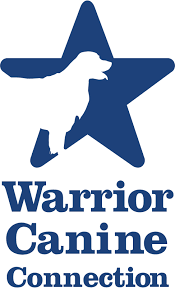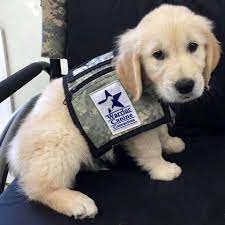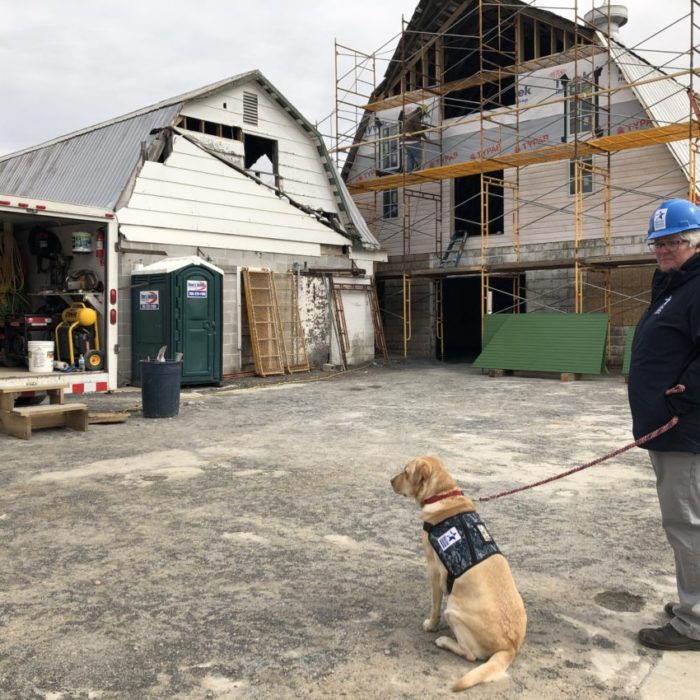Warrior Canine Connection
About Warrior Canine Connection
Warrior Canine Connection utilizes a Mission Based Trauma Recovery model to help recovering Warriors reconnect with life, their families, their communities, and each other. Warriors interact with dogs from birth through adulthood, training these dogs to act as service dogs for wounded Warriors.
Warrior Trainers benefit from the animal-human connection, while wounded Warriors receive the support that a service dog can provide.
Warrior Canine Connection is an accredited member of Assistance Dogs International (ADI), a global organization that establishes and promotes standards of excellence in all areas of assistance dog acquisition, training and partnership.
Mission Based Trauma Recovery
Warrior Canine Connection utilizes a Mission Based Trauma Recovery model to help Warriors recovering from the stress of combat reconnect with their families, communities, and life.
By interacting with the dogs as they move from puppyhood to training to adult service dogs, Warrior Trainers benefit from a physiological and psychological animal-human connection. As a result of their efforts, Veterans with disabilities receive the finest in trained service dogs.
This program is powered in part by Wounded Warrior Project® to honor and empower post-9/11 injured service members, veterans, and their families.
Program Details
Training a service dog for a fellow Veteran provides a valuable opportunity for a Warrior suffering from psychological injuries to reintegrate into civilian life. As part of their training, Warriors have the responsibility to teach the dogs that the world is a safe place. Through that process, they must convince themselves of the same.
Warrior trainers are taught to praise and provide treats to their dogs when they experience a startling event, such as hearing a car backfire. Rather than turning inward to focus on their past trauma, the trainers must get outside of their own heads to focus on the dogs and their mission to help another Veteran. Additionally, dogs offer opportunities for Warrior trainers – who often isolate themselves from society – to experience positive interactions with members of the community. Their training requires emotionally numb Warriors to demonstrate positive emotion in order to successfully teach their dogs.
Warriors participating in the program have reported that using these positive emotions to praise their dogs has significantly improved their family dynamics, as their children are able to experience and respond to this positive parenting strategy.
Dog Applicants
Eligibility:
If you are interested in applying for an Assistance Dog from Warrior Canine Connection (WCC), please review the eligibility requirements below for information on the types of dogs we provide and the application process.
After reviewing the following information, if you feel you meet these eligibility requirements, we invite you to fill out an inquiry form. Please note that the inquiry form is not the full application.
General Eligibility and Non-Discrimination Policy:
To be eligible to receive an Assistance Dog from WCC, the applicant must satisfy the eligibility requirements stated here and in the program materials. WCC is committed to providing its services and administering its programs in a nondiscriminatory manner, and in accordance with applicable law. All applicants and program participants are treated equally and we do not discriminate on an individual’s race, sex, religion, color, national origin, ancestry, physical or mental disability, medical condition, marital status, sexual orientation, age, gender identity, gender expression, genetic characteristics, or any other basis prohibited by law. WCC is further committed to treating all Veterans with dignity and respect at all times.
General Eligibility Requirements:
WCC trains and places Service Dogs to assist Veterans with mobility impairments and/or to help mitigate the symptoms of service connected Post-traumatic Stress Disorder (PTSD) or Traumatic Brain Injury (TBI). We also train and place Assistance Dogs that work in other capacities, such as Facility Dogs and Military Family Support Dogs. Each type of placement has specific eligibility requirements, which are further explained below.
Please note that assistance dog training is a specialized field, and while we work with Veterans who have a variety of disabilities, our dogs are not specifically trained as Guide Dogs (assist blind and visually impaired individuals), as Hearing Dogs (assist deaf and hard of hearing individuals) or any category of Medical Alert dogs. Please also note that Service Dogs are not intended as a substitute or replacement for medical interventions otherwise recommended by a healthcare provider.
There is no fee for the dog or for the training. Applicants are not required to participate in fundraising or public relations activities without their expressed and voluntary permission.
Dogs are matched with Veterans based on the dog’s skills, strengths, temperament, and energy level, as well as the applicant’s needs, experience, personality, and lifestyle. There may be an indefinite wait for the right dog to become available for a particular applicant.
Existing WCC clients who have applied for a successor dog are given priority on the waiting list provided that they are in good standing and continue to meet applicable eligibility requirements.
Service Dog Applicants:
- Be a Veteran, or in the later stages of the process of medical evaluation for separation from the military.
- Have a referral or recommendation, and the support of your healthcare provider for obtaining an assistance dog.
- Have a qualifying disability that impacts your quality of life, independence and ability to engage in activities of daily living. Qualifying disabilities include physical injury, service-connected PTSD, and/or TBI.
- Applicants who apply for a Service Dog to assist with mitigating the symptoms of PTSD must complete a behavioral health history and provide us with permission to allow our client services team to communicate directly with your providers.
- Applicants must be able to describe relevant history, such as effective and ineffective coping strategies, psychological triggers, which traditional evidence-based interventions you have tried in the past and how they worked or did not work, and how you believe that an assistance dog would help increase your independence and engagement in daily activities.
- Be willing and able to provide for the dog’s physical, emotional and financial needs.
- Applicants who apply for a Service Dog to assist with physical disability must have completed their in-patient rehabilitation program and/or be at least one (1) year post-injury/on-set of disability.
- If applying for a Service Dog to assist with mitigating symptoms of PTSD, you must be successfully engaged in your individualized treatment program for a minimum of six months.
- Strive to have a positive, “can do” attitude and effectively implement emotional regulation tools/techniques as needed.
- Have a stable home environment, the support of all other household and family members, and be comfortable allowing us to help evaluate the suitability of your home environment.
- Have a desire for more independence.
- Be financially stable.
- Have an open mind and willingness to learn.
- Be able to attend an intensive two-week Team Training Camp at WCC’s Healing Quarters in Maryland, as well as cover your airfare, accommodations, and transportation. In some cases, WCC may be able to assist Service Dog applicants with certain accommodation and transportation costs.
Military Family Support Dog (MFSD) Applicants:
- Must be an active duty Service Member or a Veteran whose family would benefit from a dog.
- Have a referral or recommendation, and the support of your healthcare provider for obtaining a MFSD.
- Be able to describe your need for a MFSD to help facilitate family relationships.
- Be willing and able to provide for the dog’s physical, emotional and financial* needs.
- Strive to have a positive, “can do” attitude and effectively implement emotional regulation tools/techniques as needed.
- Have a relatively stable home environment and support of all other household members.
- Be financially stable.
- Have an open mind and willingness to learn.
- Be able to attend an intensive one-week Team Training Camp at WCC’s Healing Quarters in Maryland, as well as cover your airfare, accommodations, and transportation.
Facility Dog Applicants Must:
- Work in a treatment or healthcare facility that provides care for active duty Service Members or Veterans.
- Be able to describe how a Facility Dog would provide support for the population that you serve.
- Be willing and able to provide for the dog’s physical, emotional and financial needs.
- Have a positive, “can do” attitude.
- Have a stable home environment and support of all other household members.
- Have full support of the clinical team and leadership at your facility.
- Be financially stable.
- Have a open mind and willingness to learn.
- Be able to attend an intensive one-week Team Training Camp at WCC’s Healing Quarters in Maryland, as well as cover your airfare, accommodations, and transportation.
If you feel you meet these eligibility requirements and would like an application, or if you have additional questions, please email the Client Services Team.
*The following are estimated yearly costs for a service dog. The actual cost will vary depending on location.
Food
Toys/Treats/Misc.
Monthly Preventatives
Veterinarian Visits
Total:
$480 – $600
$200 – $500
$360 – $480
$200 – $500
$1,240 – $2,080
Emergency Care: One visit can cost a minimum of $1,000
Warrior Canine Connection West Coast Programs:
Address: VA Menlo Park Welcome Center
795 Willow Road, Menlo Park, CA 94025 –
Phone: (650) 493-5000, ext. 20203
WCC Healing Quarters
In partnership with Montgomery County, the State of Maryland, and countless individual and corporate supporters, WCC is creating a premier center where Veterans and Military Family Members can come to heal from the visible and invisible wounds of war. The new Warrior Canine Connection Healing Quarters facility will provide space for the organization’s unique Mission Based Trauma Recovery (MBTR) program, as well as critical facilities needed to breed, train and partner future service dogs.
In order to realize its vision of expanding programs to tens of thousands of additional Veterans in need, WCC has embarked on an ambitious campaign to build these much-needed facilities for puppies, service dogs in training, the Warriors who train them and Veteran clients who will work with their service dogs in advance of placement.
Expanding Services to Wounded Veterans and Military Families:
On May 28, 2014, State of Maryland officials approved a long-term lease on 80-acres of parkland on the grounds of Seneca Creek State Park in Montgomery County, Maryland. This site will not only accommodate WCC’s long-term needs, but is consistent with Maryland Department of Natural Resources’ commitment to “support the physical and psychological well-being of American servicemen and women injured in service to our country.”
In 2015, WCC broke ground on this comprehensive Healing Quarters facility. Located 30 minutes from Walter Reed National Military Medical Center (WRNMMC), the site has the potential to:
- increase WCC’s ability to serve thousands more recovering Veterans and their families;
- provide facilities necessary to expand the breeding program, thereby increasing the number of dogs available for new therapeutic service dog training program sites and service dog placements;
- expand opportunities for Veterans who wish to pursue careers in service dog training;
- provide critical training facilities for wounded Warriors receiving service dogs; and
- allow for the expansion of other animal-assisted therapies and forms of integrative medicine, such as equine-assisted therapy, art therapy, therapeutic farming and gardening, among others.
Tax ID
45-2981579Tell Roger About Your Experience
We'd love to hear about your experience with this organization. Please consider leaving a review to help us make Roger the best resource for veterans.
Leave a Review


